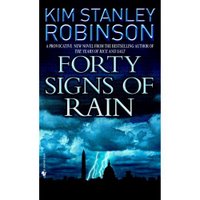 By Nancy Jane Moore
By Nancy Jane Moore"Since we're going to be facing abrupt climate change, we need abrupt social change."
So says science fiction author Kim Stanley Robinson. He was speaking on global warming issues at the Washington, D.C., area science fiction convention Capclave.
The issues surrounding human-caused climate change can get very scary, so it's nice to be able to report that Robinson is an optimist. Asked if it wasn't already too late to do anything, he said, "Toss 'too late' out the window." If we wallow around thinking it's too late, that will become a self-fulfilling prophecy.
Robinson thinks that technological fixes that can turn things around on the climate change front are physically possible within 10 years. Of course, such changes require political will, and right now virtually no one in politics (Al Gore being the most obvious exception and he doesn't hold an elected office) is doing anything. Politics needs to become more scientific -- right now, unfortunately, it's almost anti-scientific.
And that's the argument for social change, because a shift in our culture will affect politics. Robinson argues in particular for a de-linkage between consumption and health and happiness. Right now we've got the two things tied together.
He points out that we are still primates, and that many of the things that bring us joy are very basic: walking, running, dancing, sex, making music, telling stories, having ideas, making things, exploring, hunting, gathering, playing with animals, looking at fire, feeling emotions, and even being terrified (he explains that last item as the only possible explanation for horror movies). Part of his talk was designed to encourage us all to spend more time on those basic activities -- ones that, for the most part, are easier on the planet.
We all respond to the sublime, which he defines as something not human, in which your instinct says you're in danger, though your rational mind says you're not -- like standing on a cliff looking over a great valley or watching a storm roll in.
But these days we live in the technological sublime -- think cars, elevators, airplanes, not to mention the amount of time we spend in front of computers, TVs, and video games. (To wrap your head around the sublime side of this, think about driving a several-thousand-pound car through traffic or just the concept of flying through the air, something no human can do unaided.) And Robinson thinks that to be in the sublime all the time is too much for humans, thus his emphasis on getting outside and doing primate things.
"The world is our body," Robinson says, and he's not talking about mystical concepts of Gaia, but the more scientific practical points. We breathe in air and it becomes part of our bodies. We share most of our DNA with practically every living thing on Earth. When it comes down to it, we're more like jelly fish than we think -- jelly fish have such thin skins that oxygen flows in and out through them.
Robinson makes one other key point: the idea that we must value the environment over the economy to deal with global warming is a false dichotomy. The two are not opposites. The problem is that we have defined economy in very limited terms, essentially as profits -- and particularly short-term profits -- over everything else. That is not a necessary definition. We could redefine accounting to include damage to the environment or the using up of a scarce resource as a cost of doing business, for example.
Robinson's current series of novels, Forty Signs of Rain, Fifty Degrees Below, and the forthcoming Sixty Days and Counting, deal with global warming. When it flooded here in Washington last June, I wrote briefly about Forty Signs of Rain, in which Robinson visits disastrous global warming floods on the nation's capital.
Robinson's books and his talk just shore up my theory -- expressed on here in "Do you read science fiction" -- that science fiction is one of the best places for us to learn how to think about and plan for the future. You can learn a lot about what's going on, and try on new ideas for size, by reading Robinson's books.

No comments:
Post a Comment